| Listing 1 - 10 of 10 |
Sort by
|
Book
ISBN: 0815308256 Year: 1994 Publisher: New York (N.Y.) : Garland,
Abstract | Keywords | Export | Availability | Bookmark
 Loading...
Loading...Choose an application
- Reference Manager
- EndNote
- RefWorks (Direct export to RefWorks)
Criminal law --- Criminal liability. --- Justification (Law). --- Philosophy.
Book
ISBN: 185521489X Year: 1994 Publisher: Aldershot Dartmouth
Abstract | Keywords | Export | Availability | Bookmark
 Loading...
Loading...Choose an application
- Reference Manager
- EndNote
- RefWorks (Direct export to RefWorks)
Justification (Theory of knowledge) --- Knowledge, Theory of --- Theory of knowledge
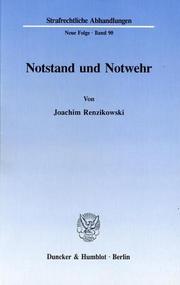
ISBN: 3428080564 Year: 1994 Publisher: Berlin : Duncker und Humblot,
Abstract | Keywords | Export | Availability | Bookmark
 Loading...
Loading...Choose an application
- Reference Manager
- EndNote
- RefWorks (Direct export to RefWorks)
Criminal liability --- Justification (Law) --- Necessity (Law) --- Self-defense (Law)
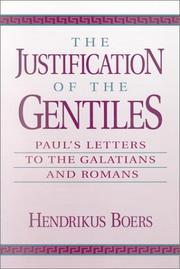
ISBN: 1565630114 Year: 1994 Publisher: Peabody Hendrickson
Abstract | Keywords | Export | Availability | Bookmark
 Loading...
Loading...Choose an application
- Reference Manager
- EndNote
- RefWorks (Direct export to RefWorks)
Justification (Christian theology) --- History of doctrines --- Bible. --- Criticism, interpretation, etc.
Book
ISBN: 0819194255 Year: 1994 Publisher: Lanham University press of America
Abstract | Keywords | Export | Availability | Bookmark
 Loading...
Loading...Choose an application
- Reference Manager
- EndNote
- RefWorks (Direct export to RefWorks)
Jewish law --- Justification (Christian theology) --- Biblical teaching --- Paul, --- Bible. --- Theology.
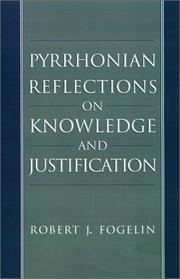
ISBN: 0195089871 0199833230 9786610441594 1280441593 019802505X 142376501X Year: 1994 Publisher: New York (N.Y.): Oxford university press
Abstract | Keywords | Export | Availability | Bookmark
 Loading...
Loading...Choose an application
- Reference Manager
- EndNote
- RefWorks (Direct export to RefWorks)
Justification (Theory of knowledge) --- Ongeloof --- Scepticism --- Scepticisme --- Skepticism --- Unbelief --- Agnosticism --- Belief and doubt --- Free thought --- Knowledge, Theory of --- Skepticism. --- Justification (Theory of knowledge).
Book
ISBN: 3525551673 Year: 1994 Publisher: Göttingen Vandenhoeck und Ruprecht
Abstract | Keywords | Export | Availability | Bookmark
 Loading...
Loading...Choose an application
- Reference Manager
- EndNote
- RefWorks (Direct export to RefWorks)
Clergy --- Justification (Christian theology) --- History --- History of doctrines --- Bugenhagen, Johann, --- Hamburg (Germany) --- Church history
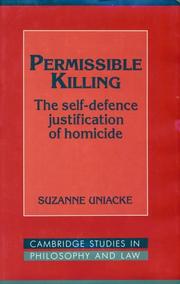
ISBN: 0521454085 0521564581 0511554486 9780521564588 9780511554483 9780521454087 Year: 1994 Volume: *7 Publisher: Cambridge Cambridge University Press
Abstract | Keywords | Export | Availability | Bookmark
 Loading...
Loading...Choose an application
- Reference Manager
- EndNote
- RefWorks (Direct export to RefWorks)
Do individuals have a positive right of self-defence? And if so, what are the limits of this right? Under what conditions does this use of force extend to the defence of others? These are some of the issues explored by Dr Uniacke in this comprehensive 1994 philosophical discussion of the principles relevant to self-defence as a moral and legal justification of homicide. She establishes a unitary right of self-defence and the defence of others, one which grounds the permissibility of the use of necessary and proportionate defensive force against culpable and non-culpable, active and passive, unjust threats. Particular topics discussed include: the nature of moral and legal justification and excuse; natural law justifications of homicide in self-defence; the Principle of Double Effect and the claim that homicide in self-defence is justified as unintended killing; and the question of self-preferential killing. This is a lucid and sophisticated account of the complex notion of justification, revolving around a critical discussion of trends in the law of self-defence.
Justifiable homicide --- Justification (Droit) --- Justification (Law) --- Légitime défense --- Noodweer (Recht) --- Rechtvaardiging (Recht) --- Self-defense (Law) --- Justifiable homicide. --- Moral and ethical aspects. --- Arts and Humanities --- Philosophy --- Homicide --- Actions and defenses --- Criminal law --- Necessity (Law) --- Self-help (Law)
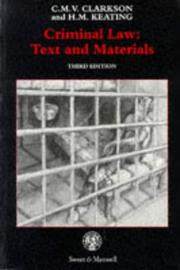
ISBN: 0421482109 Year: 1994 Publisher: London : Sweet & Maxwell,
Abstract | Keywords | Export | Availability | Bookmark
 Loading...
Loading...Choose an application
- Reference Manager
- EndNote
- RefWorks (Direct export to RefWorks)
343 <41> --- Strafwetenschappen--(algemeen)--Verenigd Koninkrijk van Groot-Brittannië en Noord-Ierland --- 343 <41> Strafwetenschappen--(algemeen)--Verenigd Koninkrijk van Groot-Brittannië en Noord-Ierland --- ANGLETERRE --- DROIT PENAL --- PEINES --- RESPONSABILITE --- JUSTIFICATION --- CAUSES --- DELITS CONTRE LES PERSONNES --- HOMICIDE --- THEORIE GENERALE
Book
ISBN: 0691631689 1400863910 Year: 1994 Publisher: Princeton, New Jersey : Princeton University Press,
Abstract | Keywords | Export | Availability | Bookmark
 Loading...
Loading...Choose an application
- Reference Manager
- EndNote
- RefWorks (Direct export to RefWorks)
The first woman known to have written in English, the fourteenth-century mystic Julian of Norwich has inspired generations of Christians with her reflections on the "motherhood" of Jesus, and her assurance that, despite evil, "all shall be well." In this book, Denise Baker reconsiders Julian not only as an eloquent and profound visionary but also as an evolving, sophisticated theologian of great originality. Focusing on Julian's Book of Showings, in which the author records a series of revelations she received during a critical illness in May 1373, Baker provides the first historical assessment of Julian's significance as a writer and thinker.Inscribing her visionary experience in the short version of her Showings, Julian contemplated the revelations for two decades before she achieved the understanding that enabled her to complete the long text. Baker first traces the genesis of Julian's visionary experience to the practice of affective piety, such as meditations on the life of Christ and, in the arts, a depiction of a suffering rather than triumphant Christ on the cross. Julian's innovations become apparent in the long text. By combining late medieval theology of salvation with the mystics' teachings on the nature of humankind, she arrives at compassionate, optimistic, and liberating conclusions regarding the presence of evil in the world, God's attitude toward sinners, and the possibility of universal salvation. She concludes her theodicy by comparing the connections between the Trinity and humankind to familial relationships, emphasizing Jesus' role as mother. Julian's strategy of revisions and her artistry come under scrutiny in the final chapter of this book, as Baker demonstrates how this writer brings her readers to reenact her own struggle in understanding the revelations.Originally published in 1994.The Princeton Legacy Library uses the latest print-on-demand technology to again make available previously out-of-print books from the distinguished backlist of Princeton University Press. These editions preserve the original texts of these important books while presenting them in durable paperback and hardcover editions. The goal of the Princeton Legacy Library is to vastly increase access to the rich scholarly heritage found in the thousands of books published by Princeton University Press since its founding in 1905.
Mysticism --- History --- Aelred of Rievaulx. --- Aevum. --- Affective piety. --- Allusion. --- Analogy. --- Anchorite. --- Anno Domini. --- Anselm of Canterbury. --- Archetype. --- Augustine of Hippo. --- Augustinian theodicy. --- Augustinians. --- Bernard McGinn (theologian). --- Bernard of Clairvaux. --- Body of Christ. --- Canonical hours. --- Catharism. --- Christian. --- Christology. --- Church Fathers. --- Cistercians. --- Contrition. --- Curate. --- Damnation. --- Deity. --- Divine grace. --- Dualism. --- El Shaddai. --- Elaine Pagels. --- Erudition. --- Exegesis. --- Felix culpa. --- Glorification. --- God the Father. --- God the Son. --- God. --- Grace Jantzen. --- Hagiography. --- Hermeneutics. --- Hilda of Whitby. --- Iconography. --- Image of God. --- Immanence. --- Intercession. --- John Hick. --- John Meyendorff. --- John of Beverley. --- Julian May. --- Julian of Norwich. --- Justification (theology). --- Litany. --- Luttrell Psalter. --- Manichaeism. --- Manifestation of God. --- Margery Kempe. --- Mary Magdalene. --- Meister Eckhart. --- Messiah. --- Metonymy. --- Mysticism. --- Neoplatonism. --- Norwich Cathedral. --- Omnipotence. --- Omniscience. --- Origen. --- Parable. --- Patristics. --- Pelagianism. --- Penitential. --- Pierre Teilhard de Chardin. --- Plotinus. --- Predestination. --- Prevenient grace. --- Problem of evil. --- Propitiation. --- Pseudo-Dionysius the Areopagite. --- Purgatory. --- Ralph Manheim. --- Religion. --- Reprobation. --- Richard Rolle. --- Salvation. --- Sanctification. --- Scholasticism. --- Sermon. --- Sola gratia. --- Soteriology. --- Spirituality. --- Tertullian. --- The Book of Margery Kempe. --- The Mirror of Simple Souls. --- The Parson's Tale. --- Theodicy. --- Theology. --- Thomas Aquinas. --- Thomism. --- Treatise. --- Venial sin. --- Walter Hilton. --- William of Ockham. --- Julian,
| Listing 1 - 10 of 10 |
Sort by
|

 Search
Search Feedback
Feedback About UniCat
About UniCat  Help
Help News
News